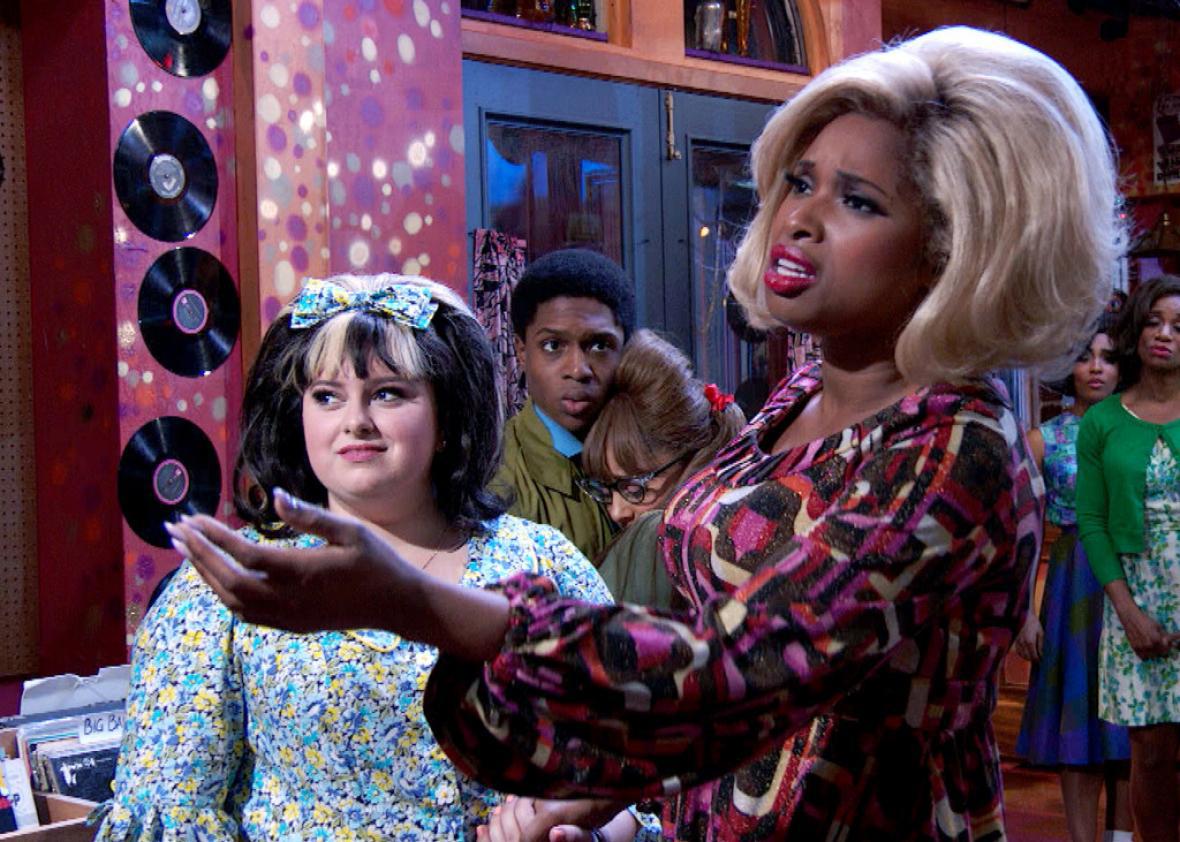Despite a rocky start, NBC’s resurrection of the live televised musical has emerged as one of broadcast TV’s more effective gambits in recent years. It can be easy to read the genre as a cynical ratings ploy, a line of glitzy productions with big names attached for expensive ad buys. But the transporting power of musical escapism—particularly well-done escapism, as was the case with last year’s The Wiz Live!—can be difficult to deny.
NBC’s choice of Hairspray for its next live event turned out to be more prescient than was likely intended. John Waters’ original 1988 cult film was relatively surreal, a spoof of ’60s progressivism and culture, but the musical has since evolved, having been churned through the Broadway and Hollywood machines into a sort of ’60s utopian dream. Hairspray as it stands today unabashedly conflates fat-phobia with racism and envisions an integrated society, with people of all shapes and sizes and complexions coming together to sing, dance, and fall in love. It deliberately shies away from harsher truths and ignores more realistic paths to progress. Considering the divisive political climate we’re currently living through, such a tidy formula could either—depending on the execution—make for the perfect sweetened cocktail or the latest unwarranted attempt to try to get the country to forget its troubles.
Hairspray has gone through so many incarnations that, inevitably, some of its original spark has been lost along the way. This new version, as directed by Kenny Leon (also behind The Wiz Live!), was certainly competent, featuring several show-stopping performances, strong acting across the board, and even a slight nod to Waters’ campy vision via Harvey Fierstein’s drag turn as matriarch Edna Turnblad (reprising his Broadway role). (And, OK, a technical glitch or two.) But it couldn’t help but show some wear and tear: the abrupt transitions, the thinner characterizations, the (even) sunnier tone. And NBC’s efforts to bolster the production didn’t help either. Having Darren Criss (Glee) play “host” and guide audiences into each ad break created a tension between art and product; even worse was Derek Hough, in character as local TV host Corny Collins, filming a shameless Oreo ad fresh off his biggest number in the show. The corporate synergy on display undercut the story’s themes, about marginalized groups breaking through systemic barriers. More generally, it gave the production a mechanical feel, a shield of artificiality that could be difficult to break through.
There was one exception, of course, and it was enough to make Hairspray Live! work in the end: Jennifer Hudson. Near the end of Act 1, she stormed onto the stage as Motormouth Maybelle, the hostess of The Corny Collins Show’s designated “Negro day” and a surrogate mother for the show’s Baltimore black community. Hudson made quick, lively work of her first number “Big, Blonde and Beautiful,” which conveniently kicked the musical into gear as it headed toward its back half. But it was her rendition of “I Know Where I’ve Been” that shook the entire show. Raw, pained, and with enormous vocal power, Hudson injected the production with exactly the kind of energy it’d been missing. By the time she’d finished—nailing that final note—her cast members were visibly in tears around her, seemingly in awe along with the audience at the performance they’d just witnessed. There, finally, was the magic of live television that NBC had been so relentlessly promising.
The performance recalled, among other things, precisely what Hudson managed to do with Dreamgirls, another sugary production that often stumbled when it came to social commentary. In Hairspray Live!, Hudson’s role was perhaps even more significant. Motormouth’s part in the story is small but pivotal: Her record shop is a place of community and protest, the site where she, along with Tracy (Maddie Baillio) and the rest of the Hairspray heroes, decide to march on The Corny Collins Show and convince a national audience in real time to support integration. “I Know Where I’ve Been” is an acknowledgment of struggle and a testament of strength; it’s the song where, if done right, the characters and the conflict of Hairspray really come to life. Hudson not only achieved that, but with a twinge of gospel and an overpowering warmth, she single-handedly made the argument for unity and healing that the show had otherwise failed to make.
Hudson’s honesty and rawness left the unyielding optimism of Hairspray feeling a little less fake, a little more cathartic. In a departure from the recent Hairsprays, even blatantly racist villains Velma (Kristin Chenoweth) and Amber (Dove Cameron) were allowed a (somewhat) happy ending, to dance to “You Can’t Stop the Beat” with the rest of the cast. Tracy’s proud declaration at the climax that Corny Collins was officially “integrated,” meanwhile, could reasonably be construed as parody. Indeed, the production was a little too comfortable with spiffy choreography and clean storytelling, verging on monotonous as a result. It was blinded by positivity. But the joy—the promise of a better tomorrow—that Hairspray provides should be more than welcome during such ugly, uncertain times. In a production that often forgot the importance of appealing to our ears as well as our hearts, it was Hudson who issued a startling reminder: This isn’t just a show about dreaming of a better future. It’s a show about people, real people, coming together and fighting for what’s right.
